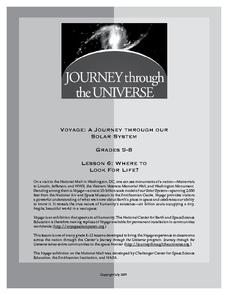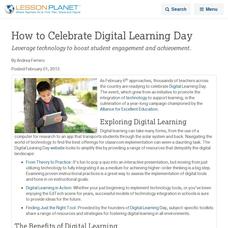Curated OER
Exploring Ecosystems
Fourth graders investigate ecosystems. In this ecosystem instructional activity, 4th graders explore producers, consumers, and decomposers and study the interdependence of each.
Curated OER
Plotting Temperature and Altitude
learners convert the temperature readings from degrees Celsius to degrees Fahrenheit. they predict and create a graph of what the graph of altitude (x-axis) versus temperature in degrees Fahrenheit (y-axis) might look like.
Curated OER
Amazing -- Saturn Is So Far Away!
Students work together to create a scale model of the distances between the planets. They write a paragraph to describe Saturn and their make-believe trip to the planet. They identify other characteristics of Saturn as well.
Curated OER
Wow, Saturn Is Much Bigger Than Earth!
Young scholars compare and contrast the sizes of Earth and Saturn. They create scale illustrations of each planet and label them. They share their models with the class.
Curated OER
Rotating Rings of Ice
Students work together to develop a model of Saturn and its rings. They identify what types of materials make up the rings and how they revolve around Saturn. They write a short paragraph describing the rings.
Curated OER
How Far Away is SOHO?
Students create a scale model of the Earth and the sun that demonstrates where the SOHO satellite is in relation to the Earth.
Curated OER
Robots from Junk
Students create balloon and rubber band models of robotic rovers to investigate the concepts of mass, torque, and friction. Through research and planning, students construct a rover test-bed that simulates the Martian environment.
Curated OER
All About Circuits ~ Atomic Structure
In this interactive Internet assignment, physical science investigators answer 11 questions about the atom, the subatomic particles, and atomic structure. They can click on "Reveal Answer" to discover if they are correct. They also...
Curated OER
It's A Meteor
Young scholars complete a webquest to find Earth's relationship to the sun. In this webquest lesson, students complete tasks to understand the effect of the sun on weather and time. Young scholars create a multimedia presentation as an...
Journey Through the Universe
Where to Look For Life?
Every year we discover new planets including more than 1,000 in 2016 alone. Will we ever find life on another planet? The lesson includes two activities to help scholars understand this concept. First, they analyze the temperature range...
Journey Through the Universe
Is There Anyone Out There?
What is an alien's favorite game? All-star baseball! Scholars start defining living and non-living. Then, they conduct experiments to research if life exists, keeping in mind that life could be in many forms, not just human.
Curated OER
Galaxy Adventure
Working in groups, learners create a mnemonic device, give an oral presentation, and create a pictorial representation of the correct sequence of the planets and asteroid belt from the sun. An assessment rubric is included in the...
California Academy of Science
Kinesthetic Astronomy: Mars Opposition Dance
Your class will watch as one child orbits the sun as Earth, while another orbits as Mars. If the timing is right, they will see the repetitive dance between the two planets and discover how often they are opposite from each other. For...
University of Colorado
Can Photosynthesis Occur at Saturn?
In the 19th activity of 22, learners determine if distance from a light source affects photosynthesis. Participants capture oxygen in straws and find that the amount of water the gas displaces is proportional to the rate of photosynthesis.
University of Colorado
Astro-Chronology
Class members play a version of the game Chronology to determine when certain scientific events occurred in history. Teams play until someone has 5-10 events in the correct order.
Science 4 Inquiry
The Impact of the Sun and Moon on Tides
In 150 BC, Seleucus of Seleucia theorized that the moon causes the tides. Scholars learn about what causes tides by studying the interactions of gravity between the sun, moon, and Earth. They use technology to formalize otherwise...
Curated OER
Inside an Atom
In this atom worksheet, students read about the history of the discovery of the atom. Students write a story, poem, song or other creative project in which they shrink to an incredibly small size and are trapped in a carbon atom.
University of Colorado
Using Spectral Data to Explore Saturn and Titan
Saturn's rings are made of dust, ice, and solid chunks of material. Individuals use spectrographs in this final installment of 22 lessons to determine the atmospheric elements. They analyze spectrums from Titan's atmosphere and Saturn's...
NASA
Space-Based Astronomy on the Internet
Young scientists compile everything they have learned into a report in the fifth and final lesson in a unit on the visible light spectrum. Access to photos from observatories, telescopes, and satellites allows learners to compare and...
Curated OER
SIZING UP SOL
Ninth graders produce a projected, pinhole image of the sun and from measurement of the image and projection distance, calculate the actual size of the sun. They estimate the sun's apparent brightness from different planet.
Curated OER
The Building Blocks
This PowerPoint is a comprehensive review of all the facts related to an atom's basic structure and function. What makes this unique is that it is geared toward an audience of junior geologists. After introducing the periodic table of...
UAF Geophysical Institute
Carbon Footprint
Your young environmentalists can calculate their carbon footprint and discuss ways to reduce it with a worksheet about climate change. After reading a handout about what impact one's carbon footprint can have on the environment, kids...
Curated OER
How to Celebrate Digital Learning Day
Leverage technology to boost student engagement and achievement.
University of Colorado
Spacecraft Speed
Space shuttles traveled around Earth at a speed of 17,500 miles per hour, way faster than trains, planes, or automobiles travel! In the 13th installment of 22, groups graph different speeds to show how quickly spacecraft move through...

























